

Read on to learn about reinforcement and punishment, and how they can be powerful behavioural influencers. Adolescence (15-17 years old) CDC’s Adolescent and School Mental Health Learn how connection is key to good adolescent mental health.
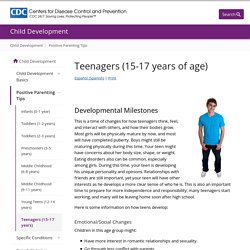
CDC’s Parent Information (Teens 12— 19) This site has information to help you learn how to guide your teen to be safe and become a healthy and productive adult. CDC’s Healthy Weight Information. Tips for parents – Ideas to help children maintain a healthy weight. CDC’s Youth Physical Activity Guidelines This site has information on how to help children be active and play. CDC’s Pregnancy Prevention for Teens. Your awkward teenage years explained. How our teenage years shape our personalities - BBC Future. How Teens Today Are Different from Past Generations. Every generation of teens is shaped by the social, political, and economic events of the day.

Today’s teenagers are no different—and they’re the first generation whose lives are saturated by mobile technology and social media. In her new book, psychologist Jean Twenge uses large-scale surveys to draw a detailed portrait of ten qualities that make today’s teens unique and the cultural forces shaping them. Common Behaviors You'll See During Each Teen Year. What is Considered Normal Teenage Behavior? - Paradigm Treatment. A decade or more ago, you made it through the “terrible twos” with your child.

Now that he or she is a teenager, you might feel as though you’re playing a whole other ballgame. Your adolescent is transitioning from a child into an adult, and they might exhibit some behaviors that are puzzling or concerning to you. 10 Normal Teenage Behavior Problems And How To Handle Them. Understanding Teenage Behavior Problems Dealing with a teenager is not easy.

No matter how good a parent you are, and how great your relationship with your children is, you are likely to face parenting roadblocks when it comes to your teenager. Behavior problems are common in teenagers. But you can deal with them with ease if you are willing to put in the effort to understand what they are going through and what it is that they need from you. MomJunction gives you insight into teenage behavioral problems and how you can deal with them without straining the relationship with your child. Reinforcements in Psychology: Definition. Definition of Reinforcement by Merriam-Webster. Re·in·force·ment | \ ˌrē-ən-ˈfȯrs-mənt 1 : the action of strengthening or encouraging something : the state of being reinforced 2 : something that strengthens or encourages something: such as.

What Is Reinforcement? Psychology, Definition, And Applications. By: Toni Hoy Updated February 11, 2021 Medically Reviewed By: Whitney White, MS.

CMHC, NCC., LPC. Positive Reinforcement in Psychology (Definition + 5 Examples) If you read our earlier piece on positive punishment, you know that there are different methods of teaching and instilling good habits and behaviors.
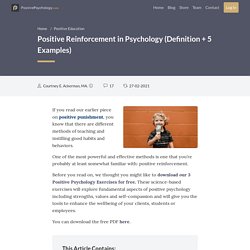
One of the most powerful and effective methods is one that you’re probably at least somewhat familiar with: positive reinforcement. Before you read on, we thought you might like to download our 3 Positive Psychology Exercises for free. These science-based exercises will explore fundamental aspects of positive psychology including strengths, values and self-compassion and will give you the tools to enhance the wellbeing of your clients, students or employees.
You can download the free PDF here. What is the Meaning of Positive Reinforcement? Positive Reinforcement. Positive Reinforcement - Tips for teaching and parenting. Using Positive Reinforcement to Improve Behavior. When your child misbehaves, rewards might be the last thing on your mind.
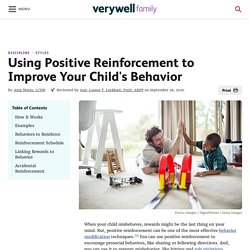
But, positive reinforcement can be one of the most effective behavior modification techniques.1 You can use positive reinforcement to encourage prosocial behaviors, like sharing or following directions. And, you can use it to prevent misbehavior, like hitting and rule violations. Positive reinforcement can also be an effective way to encourage and motivate your child to be responsible, do their chores, get along with their siblings, or complete their homework assignments without arguing.
Parenting A Teen Through Positive Reinforcement - Back On Track. Most parents can agree: the teenage years can be rough!
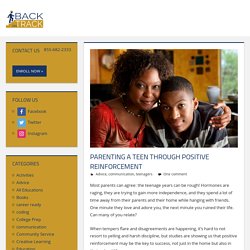
Hormones are raging, they are trying to gain more independence, and they spend a lot of time away from their parents and their home while hanging with friends. One minute they love and adore you, the next minute you ruined their life. Can many of you relate? Negative reinforcement: Definition and examples. Negative reinforcement encourages specific behaviors by removing or avoiding negative consequences or stimuli.
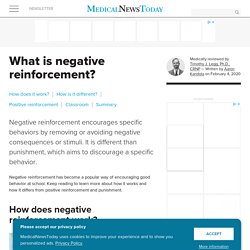
It is different than punishment, which aims to discourage a specific behavior. Negative reinforcement has become a popular way of encouraging good behavior at school. Keep reading to learn more about how it works and how it differs from positive reinforcement and punishment. Examples of Negative Reinforcement. It helps to explore some examples of negative reinforcement, a concept of operant conditioning that people frequently misunderstand. Learn what negative reinforcement is and see how it works in practice. What Negative Reinforcement Is and Is Not. Difference Between Positive and Negative Reinforcement. Positive vs. Negative Reinforcement: A Guide for Parents – Generation Mindful. I almost stopped bringing them to the playground.
With two children under the age of 4, playgrounds had been a place of respite for me. I could sit on the bench and catch up with some parent friends while my littles jumped, slid, and climbed to their heart's content in a controlled setting. We could all let off a little steam there, but leaving the playground had become such a process that I almost stopped going altogether. Inevitably, when I announced it was time to go, my 3-year-old would run away. What Is Punishment Psychology, And Should You Use It?
Updated February 01, 2021 Medically Reviewed By: Tanya Harell Source: rawpixel.com We were all punished when we were younger at one time or another. The Study of Punishment in Psychology. Punishment is a term used in operant conditioning to refer to any change that occurs after a behavior that reduces the likelihood that that behavior will occur again in the future. While positive and negative reinforcements are used to increase behaviors, punishment is focused on reducing or eliminating unwanted behaviors. Punishment is often mistakenly confused with negative reinforcement. The difference: Reinforcement increases the chances that a behavior will occur and punishment decreases the chances that a behavior will occur.
Types of Punishment. Skinner’s Operant Conditioning: Rewards & Punishments. Positive Punishment: What It Is, Benefits, and Examples. Positive punishment is a form of behavior modification. In this case, the word “positive” doesn’t refer to something pleasant. Positive punishment is adding something to the mix that will result in an unpleasant consequence. Positive Punishment and Operant Conditioning. Real-Life Examples of Positive Punishment.
12 Examples of Positive Punishment & Negative Reinforcement. Understanding Reinforcement vs. Punishment – Parenting With Psychology. What is Negative Punishment (Examples and Effectiveness) Negative Punishment Examples and Scenarios.
Frustrations of Negative Punishment - Michael Ellis. Positive vs Negative Punishment - Psychestudy. The Influence of Parents on Teenagers is Real. And More Than You Think. Parents: role models & influences on teens. Daniel Siegel: Why Teens Turn from Parents to Peers. Reinforcement vs. Punishment: Changing Behavior. Reinforcement vs Punishment Psychology [Examples]
Positive and Negative Reinforcement and Punishment. What Is the Difference Between Reinforcement and Punishment?